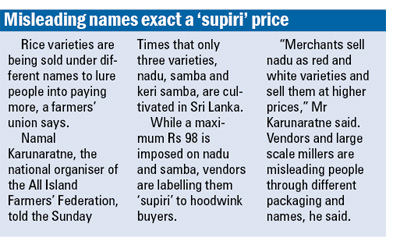News
Opportunistic millers pounce on paddy board’s handicap
Despite government efforts, large scale millers are buying wet paddy at lower prices, immediately after the harvest, a farmers’ group says.
Millers are capitalising on a situation where the Paddy Marketing Board is unable to buy wet paddy because it does not have enough capacity to dry the paddy.
As a result, farmers say they are forced to sell wet paddy at lower prices to the millers.
The president of The Dambulla Farmers Foundation, Sunil Ranweera, told the Sunday Times that indebted farmers do not have a choice but to sell their harvest to settle their liabilities.
“Most farmers don’t even have money to pay for the harvester and in mid harvest they have to pay money by quickly selling the wet paddy,” he added.
Mr Samaraweera, said that large-scale millers take advantage of the situation and buy paddy at Rs 30 per kilo of nadu and samba.
Millers buy paddy for between Rs 30 and Rs 32 and sell the rice at Rs 80 to Rs 110, and also use other names for the same varieties to deceive consumers, he said.
The president of another farmers’ association in Badalwewa, Sunil Rathnayake, said the government is not yet prepared to buy paddy.
Farmers in Hambantota plan to start harvesting by the end of the month, but PMB storages remain closed.
Stores in Ambalantota stock other items, while the Mirijjawila storage is closed.
Meanwhile, the national organiser of the All Island Farmers Federation (AIFF), Namal Karunaratne, said paddy harvesting in the main areas, Kurunegala, Ambilipitiya, Polonnaruwa, and Hambantota, would be completed by the end of March, or the first week of April.
Once the harvest is gathered, paddy prices could even plummet below Rs 33.
“The millers are on alert to quickly purchase wet paddy at the lowest possible price.”
He said the paddy mafia needs to be countered by a government plan to purchase wet paddy.
Mr Karunaratne also said the government had deceived farmers by not paying prices promised during presidential election.
The election manifesto of President Gotabaya Rajapaksa, mentions “different guaranteed prices will be set up for a kilogram of varieties of paddy: Rs. 52/- for Nadu, Rs. 57/- for Samba and Rs. 63/- for Keeri Samba”. But, the Cabinet has decided on Rs 50.
Mr Karunaratne said each variety of rice has a separate price in the market and paddy bought by the government should be priced similarly.
The head of the Paddy Marketing Board (PMD) said paddy needs to be dry.
PMD, chairman, Dr Jatal Mannaperuma told the Sunday Times, the board had begun buying nadu, samba, and keeri samba at Rs 50 following the Cabinet decision two weeks ago.
“We have been advised to purchase paddy according to government set prices. Pricing should be determined by policy makers,’’ he said.
About 500 MT per day is purchased and there are plans to buy 150,000 MT.
“If there is excess, we would store it to meet shortages,’’ he said.
Dr Mannapperuma said farmers are eager to sell the wet paddy as they have loans to pay, but the board buys paddy that has a humidity of less than 14 percent because wet paddy cannot be stored.
He also said large scale millers have huge storage areas and equipment for drying wet paddy they buy for lower prices.
The PMD has four to five drying yards at Weerawila but these are insufficient.
Millers can build paddy drying yards but not the PMD.


